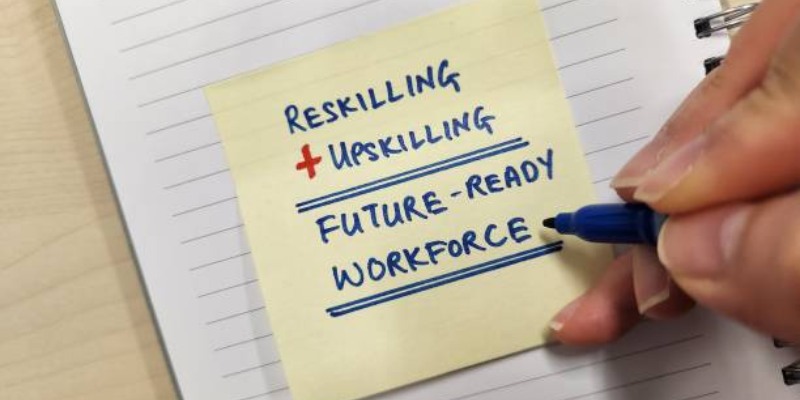General Finance
The Ultimate Guide To Upskilling While Working Full-Time
It's confusing how people think they can remain the same in a world that keeps changing every day. The truth is that growth does not wait for anyone. Jobs are changing. Skills are changing. Yet some people think they can continue to rely on the same old knowledge they acquired in school or from some training years ago. That's a setup for trouble.
It's confusing how people think they can remain the same in a world that keeps changing every day. The truth is that growth does not wait for anyone. Jobs are changing. Skills are changing. Yet some people think they can continue to rely on the same old knowledge they acquired in school or from some training years ago. That's a setup for trouble.
Why Staying the Same Is Risky
Working full-time should not be an excuse for staying stuck. Yes, it can be tiring. Yes, it can be hard. However, it is very possible to upskill while still working a 9-to-5 job or even longer hours. Those who continue to grow do not have more time than others. They make better use of the little time they have.

Every job is under pressure. Technology is moving fast, and so are employers' expectations. The skills required five years ago are no longer the same today. Someone who refuses to learn new skills is like someone who is watching a house burn while hoping it rains. It's dangerous.
People complain that they're not getting better jobs or making more money, yet they haven't added any valuable skills in the last five years. They're still bragging about the same old certificate from ten years ago. That is how people lose their relevance.
The truth is that upskilling is no longer a luxury; it has become a necessity. It is now survival. And if you're not learning, you're shrinking.
Make Peace With Your Schedule
First things first, understand this: no one has extra time hidden somewhere. Everyone gets 24 hours a day. What separates those who grow from those who remain stuck is how they use that time.
Instead of scrolling through your phone for hours after work or spending long nights watching series, that time can be used for growth. That is how working-class people upskill, not by adding more hours to the day but by changing how they use the hours they already have.
Take a deep look at your daily routine. Remove things that waste your time. Replace them with things that build you. That is how changes start.
Focus on What Helps
Upskilling is not about jumping into every random course you see online. That is another trap. Some people take ten courses in one month but cannot apply one of them in real life.
You need to be wise. Focus on skills that are useful in your job, in your field, or in the direction you want to grow. Learn things that have real value, not just things that look good on paper.
For example, if you work in marketing, it makes sense to learn about digital tools, content writing, analytics, or customer psychology. If you work in finance, skills such as Excel, financial modelling, or coding for data analysis will help you move forward. If you're in tech, there's no end to what you can keep adding.
Pick one skill. Learn it well. Then move to the next.

Choose the Right Learning Format
Don't let anyone deceive you. You don't have to go back to school to learn something new. This is not 1995. There are various ways to stay informed today — and many of them fit into a busy schedule.
There are short courses that can be completed during lunch breaks. There are podcasts you can listen to while commuting. Some ebooks and guides can be completed in just 10 minutes a day. There are even YouTube videos and tutorials that break down complex concepts in simple terms.
The key is to pick what fits your life, not someone else’s. If evenings are your free time, use them. If weekends work better for you, block time on Saturdays or Sundays. Learning is not about being fast. It’s about being steady.
Avoid the Need to Be Perfect
One thing that stops many people from upskilling is the fear of not doing it perfectly. They want to understand everything at once. They want to be experts before they even start. That's not how growth works.
When babies learn to walk, they fall many times. But they keep getting up. Adults forget this. They want to skip the messy part. But learning anything new comes with a bit of confusion at first.
Start small. Be okay with not knowing everything. Over time, things get clearer. One lesson leads to another. That is how growth builds up.
Build Discipline, Not Motivation
Waiting to feel motivated before learning is a trap. Motivation is like the weather — sometimes it shows up, other times it disappears. Discipline, on the other hand, is what keeps you going when your feelings don't want to cooperate.
You don’t need to spend five hours every day learning. Even 30 minutes daily, done consistently, will take you far. The power is in the habit, not the hype.
Some people spend weeks trying to "feel ready" before starting. Others start, and before long, they're already ahead.
Join a Learning Community
Doing things alone can be hard. That’s why it helps to join others who are also growing. It makes learning less boring and more supportive.
There are free forums, WhatsApp groups, Facebook groups, Discord servers, and Telegram channels filled with learners sharing tips, lessons, and feedback. There are also paid communities that offer more structure if you can afford them.
Being around other learners reminds you that you're not alone. It also keeps you accountable.

Apply What You Learn
Learning is one thing. Applying it is another. Some people are always in a course but never in a project. That’s how knowledge dies.
The reason you're learning is to use the skill. So, as soon as you understand a new concept, please find a way to apply it. Volunteer. Freelance. Test it on side gigs. Use it at your job if you can.
The application makes learning stick. And it's what employers and clients care about. They don't want to know what course you took. They want to see what you can do.
Know When to Slow Down
Growth is good. But burnout is real. Trying to juggle a full-time job, household chores, and learning simultaneously can become overwhelming. That's why it's okay to pause sometimes.
Take short breaks. Breathe. Reset. Growth is not a competition. It is personal. What matters is consistency over the long term, not running fast for a few weeks and crashing later.
Listen to your body and your mind. Push yourself, but not to the point of exhaustion.
When Upskilling Starts Paying Off
People may not notice at first when you're learning quietly on your own. However, over time, your knowledge will begin to manifest in your work, confidence, and results. New opportunities will come. Promotions may show up. Offers from other companies may land.
When others are still stuck wondering why life is unfair, you will realize that growth always answers to effort. You were not lucky. You were intentional.
And that is what makes the difference.
Trending










